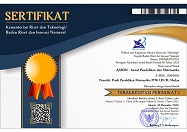The development of hypothetical learning trajectory (HLT) based on problem-based learning (PBL) in the concept of relations and functions
Abstract
This study aims to develop a learning process that aligns with the diverse thinking processes of students in Grade VIII at MTsN 9 Padang Pariaman. This is a developmental research study using the Gravemeijer and Cobb model. This development model consists of three stages: 1) Preparing for the experiment, which involves conducting a needs analysis (such as analyzing students and educators, syllabus analysis, literature review, and concept analysis), designing the HLT, and assessing the HLT (self-evaluation and expert review); 2) Conducting the experiment, which includes product trials with students at MTsN 9 Padang Pariaman through one-to-one evaluation and small group evaluation; 3) The retrospective analysis, which involves analyzing data obtained from the previous stages. The results of this analysis are used to plan activities and refine the design of future learning activities. The results of this study indicate that the developed HLT is highly valid, with an average validity score of 89.71%. This research demonstrates that an HLT based on Problem-Based Learning can be validly used in mathematics learning, specifically in the topic of relations and functions.
Keywords
Full Text:
PDFReferences
Agustin, R., & Ruli, M.R. (2023). Analisis kesulitan siswa smp dalam menyelesaikan soal matematika materi relasi dan fungsi. Jurnal Pembelajaran Matematika Inovatif, 6(1), 227-234. https://doi.org/10.22460/jpmi.v6i1.14578
Aklimawati, Listiana, Y., Isfayani, E., & Aulia, R. (2022). Pengembangan hypothetical learning trajectory (hlt) berbasis realistic mathematics education (rme) pada materi geometri. Jurnal Serunai Matematika, 14(2), 51-64. https://doi.org/10.37755/jsm.v14i2.665
Anggreni, Wi., Astuty Yensy, N., & Efrida Muchlis, E. (2020). Penerapan model pembelajaran contextual teaching and learning (ctl) untuk meningkatkan hasil belajar matematika. Jurnal Penelitian Pembelajaran Matematika Sekolah (JP2MS), 4(2), 229-237. https://doi.org/10.33369/jp2ms.4.2.229-237
Arends, R. (1997). Classroom instruction and management. Amerika Serikat: McGraw-Hill Companies.
Depdiknas. (2008). Pedoman pengembangan bahan ajar. Jakarta: Dikjen Pendidikan Dasar dan Menengah.
Eliza, R., Khadijah, & Wulandari, U. (2018). Motivasi dan kemampuan penalaran matematis siswa dengan pembelajaran kooperatif tipe pair check disertai reward pada materi fungsi. Math Educa: Jurnal Matematika Dan Pendidikan Matematika, 2(2), 128-142. https://doi.org/10.33365/jm.v5i2.2678
Fuadiah, N.F. (2017). Hypothetical learning trajectory pada pembelajaran bilangan negatif berdasarkan teori situasi didaktis di sekolah menengah. Mosharafa, 6(1), 13-24. http://e-mosharafa.org/index.php/mosharafa
Gouw, A.K. (2012). Studi deskriptif mengenai student centered learning yang diterapkan pada siswa di sma "x" bandung. Universitas Kristen Marantha.
Gravemeijer, K., & Cobb, P. (2006). Design research from a learning perspective, dalam educational design research. Amerika Serikat: Routledge.
Gravemeijer, K., Fauzan, A., & Plomp, T. (2013). The development of an rme-based geometry course for Indonesian primary schools. In Educational design research - Part B: Illustrative cases (Issue 2013). Netherlands institute for curriculum development. https://research.tue.nl/files/3900348/23590380570408.pdf
Hadi, S. (2002). Effective teacher professional development for the implementation of realistic mathematics education in indonesia [Thesis, University of Twente]. http://doc.utwente.nl/58708/
Hasanah, R., Anam, F., & Suharti, S. (2023). Penerapan model pembelajaran problem based learning untuk meningkatkan hasil belajar matematika peserta didik kelas vii b smpn 13 surabaya. JMER : Journal of Mathematics Education Research, 1(2), 1-7. https://journalng.uwks.ac.id/jmer/article/view/87
Hosnan. (2014). Pendekatan saintifik dan kontekstual dalam pembelajaran abad 21. Bogor: Ghalia Indonesia.
Hutagaol, A.S.R., Yopita, & Andau, V. (2022). Analisis kesulitan siswa dalam menyelesaikan soal cerita materi-relasi dan fungsi. J-PiMat, 4(1), 491-498. https://doi.org/10.31932/j-pimat.v4i1.1671
Isman, L.M., Karyono, H., & Rahayu, E.M. (2021). Pengaruh penerapan model problem based learning dan motivasi berprestasi terhadap hasil belajar siswa kelas v dalam mata pelajaran matematika (studi kasus sdn jemundo 1 dan sdn sadang kecamatan taman sidoarjo. Autentik: Jurnal Pengembangan Pendidikan Dasar, 5(3), 138-151. https://doi.org/10.36379/autentik.v5i2.145
Khaidir, C. (2016). Penerapan metode penemuan terbimbing dalam pembelajaran matematika di sma negeri 2 padang. Ta'dib, 16(2), 103. https://doi.org/10.31958/jt.v16i2.243
Lantakay, C.N., Senid, P.P., Blegur, I.K.S., & Samo, D.D. (2023). Hypothetical learning trajectory : bagaimana perannya dalam pembelajaran matematika di sekolah dasar ? Griya Journal of Mathematics Education and Application, 3(2), 384-393. https://doi.org/10.29303/griya.v3i2.329
Lede, Y.K., & Kii, Y.I. (2018). Lintasan belajar untuk membelajarkan materi membuat model matematika sistem persamaan linear dua variabel (spldv) bagi siswa kelas viii. Prosiding Seminar Nasional Pendidikan Matematika Etnomatnesia, 406-415. https://jurnal.ustjogja.ac.id/index.php/etnomatnesia/article/view/2355
M, I., & Rusman, M.N. (2012). Pembelajaran berdasar masalah. UNESAUniversity Press.
Muhammad, I., Yolanda, F., Andrian, D., Rezeki, S., Yanti, R.N., Melati, A.S., & Zanty, luvy S. (2022). Pengembangan media interaktif menggunakan adobe flash cs6 profesional pada materi relasi dan fungsi. JARME: Journal of Authentic Research on Mathematics Education, 4(1), 128-140. https://doi.org/10.37058/jarme.v4i1.3958
Muthmainnah, R.N., & Purnamasari, M. (2019). Analisis faktor penyebab peserta didik dengan iq tinggi memperoleh hasil belajar matematika rendah. FIBONACCI: Jurnal Pendidikan Matematika Dan Matematika, 5(1), 81. https://doi.org/10.24853/fbc.5.1.81-86
Nafiah, Y.N., & Suyanto, W. (2014). Penerapan model problem-based learning untuk meningkatkan keterampilan berpikir kritis dan hasil belajar siswa. Jurnal Pendidikan Vokasi, 4(1), 125-143. https://doi.org/10.21831/jpv.v4i1.2540
Raharjo, A.M., & Christanti, A.D.I. (2020). Analisis kesalahan siswa kelas viii smp kanisius gayam dalam menyelesaikan soal relasi dan fungsi. Seminar Nasional Pendidikan Matematika, 1(1), 281-292. https://proceeding.unikal.ac.id/index.php/sandika/article/view/421
Rahimma, W., Hadeli, Eliza, R., Remiswal, & Trinova, Z. (2024). Penerapan model pembelajaran problem based learning terhadap kemampuan berpikir kreatif dan minat belajar. An-Nahdlah: Jurnal Pendidikan Islam, 4(1), 176-183. https://doi.org/10.51806/an-nahdlah.v4i1.168
Ridha, N. (2017). Proses penelitian, masalah, variabel dan paradigma penelitian. Jurnal Hikmah, 14(1), 672-673. https://doi.org/10.1111/cgf.13898
Riduwan. (2013). Metode dan teknik penyusunan tesis. Bandung: Alfabeta.
Rosidah, I.D., Hasanah, U., Nadya., Sulistiawati. (2019). Analisis problematika peserta didik pada mata pelajaran matematika materi relasi dan fungsi. Prosiding Seminar Nasional Penelitian Pendidikan Matematika (SNP2M), Universitas Muhammadiyah Tangerang56-62.
Rozali, A., Irianto, D.M., & Yuniarti, Y. (2022). Kajian problematika teacher centered learning dalam pembelajaran siswa studi kasus: sdn dukuh, sukabumi. Journal of Elementary Education, 5(1), 78-80. https://doi.org/10.22460/collase.v5i1.9996
Siagian, M.D. (2016). Kemampuan koneksi matematik dalam pembelajaran matematika. MES: Journal of Mathematics Education and Science, 2(1). https://doi.org/10.30743/mes.v2i1.117
Simon, M. (1995). Reconstructing mathematics pedagogy from a constructivist perspective. Journal for Research in Mathematics Education, 26(2). https://doi.org/10.2307/749205
Simon, M. (2004). Explicating the role of mathematical tasks in conceptual learning: an elaboration of the hypothetical learning trajectory. Mathematical Thinking and Learning, 6(2), 91-104. https://doi.org/10.1207/s15327833mtl0602_2
Sujiani, Malahayati, E.N., & Anggraini, D.P. (2022). Efektivitas modul berbasis mind mapping untuk meningkatkan hasil belajar muatan pelajaran ipa di mts. Edutainment: Jurnal Ilmu Pendidikan Dan Kependidikan, 10(1), 32-36. https://doi.org/10.35438/e.v10i1.638
Susanto, A. (2019). Kemampuan pemahaman konsep matematis model reciprocal teaching (rt) dan model air auditory intellectualy repetition (air). Math Educa Journal, 3(2), 219-230. https://doi.org/10.15548/mej.v3i2.677
Utama, K.H., & Kristin, F. (2021). Meta-analisis pengaruh model pembelajaran problem based learning (pbl) terhadap kemampuan berpikir kritis ipa di sekolah dasar. Jurnal Basicedu, 6(4), 7174-7187. https://doi.org/10.31004/basicedu.v4i4.482
Wahyu Ariyani, O., & Prasetyo, T. (2021). Efektivitas model pembelajaran problem based learning dan problem solving terhadap kemampuan berpikir kritis siswa sekolah dasar. Jurnal Basicedu, 5(3), 1149-1160. https://doi.org/10.31004/basicedu.v5i3.892
Wilson, P. H., Mojica, G. F., & Confrey, J. (2013). Learning trajectories in teacher education: Supporting teachers' understandings of students' mathematical thinking. The Journal of Mathematical Behavior, 32(2), 102-121. https://doi.org/10.1016/j.jmathb.2012.12.003
Woi, M.F., & Prihatni, Y. (2019). Hubungan antara kemandirian belajar dengan hasil belajar matematika The relation between independent learning with the result of math studying. Teacher in Educational Research, 1(1), 1-8. https://doi.org/10.33292/ter.v1i1.3
Yanti, C.O.D., Anggraini, F., & Darwanto, D. (2019). Media pembelajaran matematika interaktif dalam upaya menumbuhkan karakter siswa. Semnasfip, 201-206. https://jurnal.umj.ac.id/index.php/SEMNASFIP/index
Yulia, Y., Musdi, E., Afriadi, J., & Wahyuni, I. (2020). Developing a hypothetical learning trajectory of fraction based on rme or junior high school. Journal of Physics: Conference Series, 1470(1), 1-9. https://doi.org/10.1088/1742-6596/1470/1/012015
DOI: http://dx.doi.org/10.30821/axiom.v14i1.19699
Refbacks
- There are currently no refbacks.
Copyright (c) 2025 Nawar Faza, Rivdya Eliza, Christina Khaidir

This work is licensed under a Creative Commons Attribution-ShareAlike 4.0 International License.
p-ISSN: 2087-8249 | e-ISSN: 2580-0450
Indexed by:
AXIOM : Jurnal Pendidikan dan Matematika is licensed under a Creative Commons Attribution-ShareAlike 4.0 International License.











